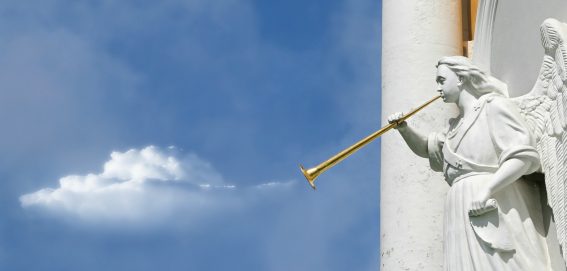Openly nostalgic with clear blues influence, this piece recalls a lazy afternoon on the prairie. The beginning has a wistful quality which opens up to a heartfelt recollection of simpler times. Out of the Blue captures a certain spirit of The American Dream and ends with a something that feels like a wide-open sky.
For string orchestra
Don’t Tread On Me begins in a formal Mozart-ian way, but quickly develops its true rock n’ roll character with bluesy swinging style. Special feroce string crossings give this piece its insistent, pulsing energy. The rhythms are straightforward and everything is idiomatic, making this piece sound more difficult to play than it is. The easy-going American feel of this piece, as well as its short, but sweet length, makes it a nice inclusion on many programs.
duration: 3’30”
(1995)
Don’t Tread On Me is Movement I of the 3-Movement string orchestra piece Signs of Life II, and is also available for string quartet.
Concert Overture for Orchestra
The story of the angel Gabriel, rendered with emotional intensity in this concert overture for orchestra, evokes a glimmering celebration of three angelic events.
- As messenger from God, Gabriel told Mary she would be the mother of Jesus, sparking Christianity
- As messenger from God, he gave the Quran to the Prophet Mohammed, sparking Islam
- When the world ends, Gabriel will be playing his horn for us, one last time
This music traces these three moods for the angel: lyric, dramatic, and apocalyptic. Your audience feels the beating of angelic wings, soaring and gliding, while the score calls upon the trumpet to be the airborne voice of love, struggle, and obliteration.
Originally the first movement of a trumpet concerto commissioned in 1988 by Doc Severinsen and the Phoenix and North Carolina Symphonies, The first movement was given a “second life” as Gabriel, through the Nashville Symphony’s American Encore Series.
– duration: 6′
– (1997)
3(3rd db. picc.)/2+E.h./2+E-flat/2+cbn. – 4/3/3/1
timp. – 3 perc. – strings
The original version of The Upward Stream with orchestra has been performed throughout the United States, as well as in Berlin, Warsaw and other European cities, and Canada, Czech Republic, England, South Korea, and Taiwan/R.O.C.
The Symphonic Band arrangement of The Upward Stream
was premiered by the Indiana University Symphonic Band,
February 5, 2013.
Review in “Percussive Notes”
The Journal of the Percussive Arts Society
~~~~~~~~~~~
In the year 2000 a timpani wave was started by Jim Brown, Principal Timpanist of the Savannah Symphony Orchestra and composer Russell Peck. I am speaking of “Harmonic Rhythm,” a concerto for timpani and orchestra performed by 39 orchestras.
The concerto opens with a crescendoed low-D roll, which leads into a massive statement by the orchestra, setting the stage for what is to follow – much like a curtain opening for a play. There are four sections to the composition: Section I is melodic and centers around the development of the melodic material. Section II is quite rhythmic and climaxes in a technical display of three-mallet playing. Section III is slow and uses such effects as dead strokes, brushes and wood mallets. Section IV returns to a more rapid rhythmic display with a brief harmonic quasi cadenza that leads to a dramatic ending.
James Houlik performs “The Upward Stream” a concerto for tenor saxophone composed by Russell Peck, with the Ludwig Symphony Orchestra at the Roswell Cultural Arts Center on
February 9, 2014
The writing of this concerto, which premiered in 2000, was inspired by the largest commissioning consortium to date in music history—39 orchestras. It was also sparked by interest among timpanists based on the composer’s well-known percussion concerto The Glory and the Grandeur and percussion trio Lift-Off. It is visually stimulating due to the unusual variety of mallets and brilliant sticking. Harmonic Rhythm requires 5 drums (4 standard sizes plus a piccolo drum).
A primary feature is the melodic writing for the timpani, which shows the instrument’s expressive range extending into areas of surprising lyricism. There is powerful action, too, of course, with jazz and rock influences, leading to a very big ending.
Section I: excerpt
Section II: beginning-excerpt
Section III: beginning-excerpt
Section IV: excerpt
Section IV: excerpt-end
Russell Peck’s programmatic tone poem about the struggle for peace. A musical tribute to all the people who have struggled against conflict itself toward a just and lasting peace for all of us.- commissioned by the Birmingham International Festival.
Recorded by the London Symphony.
Adagio
Allegro
Ending





